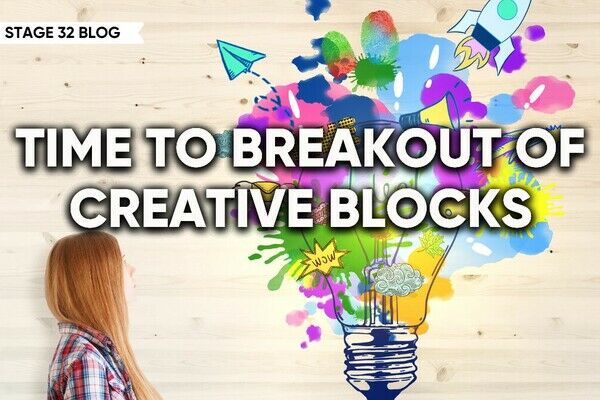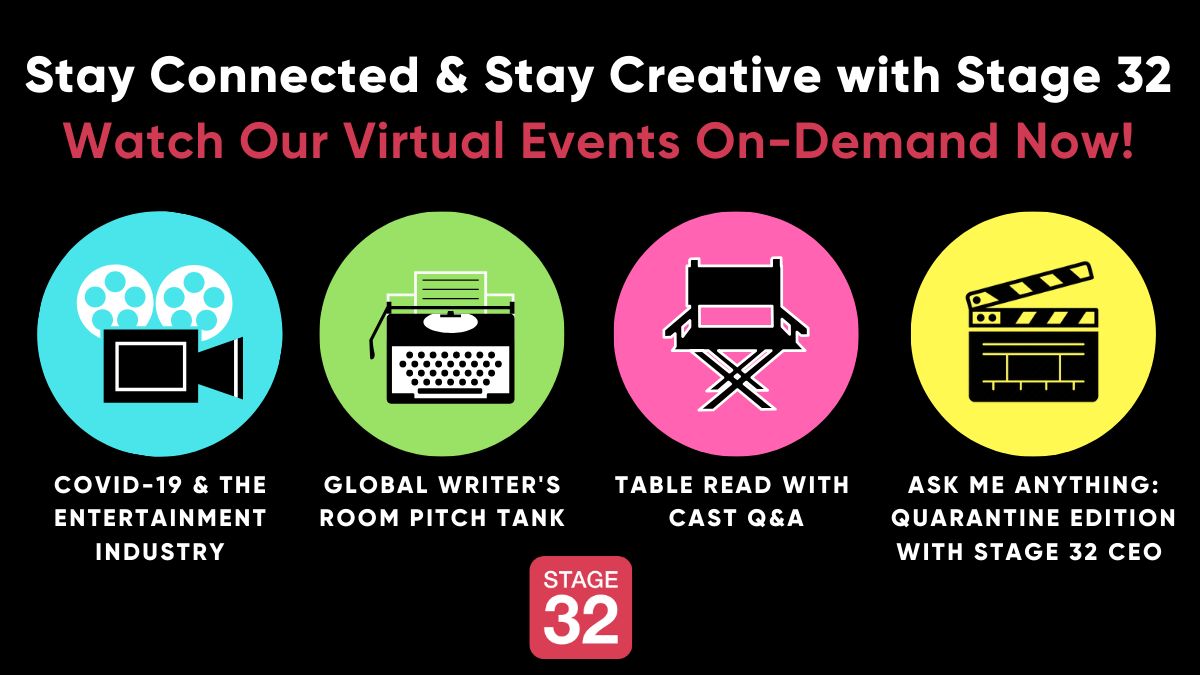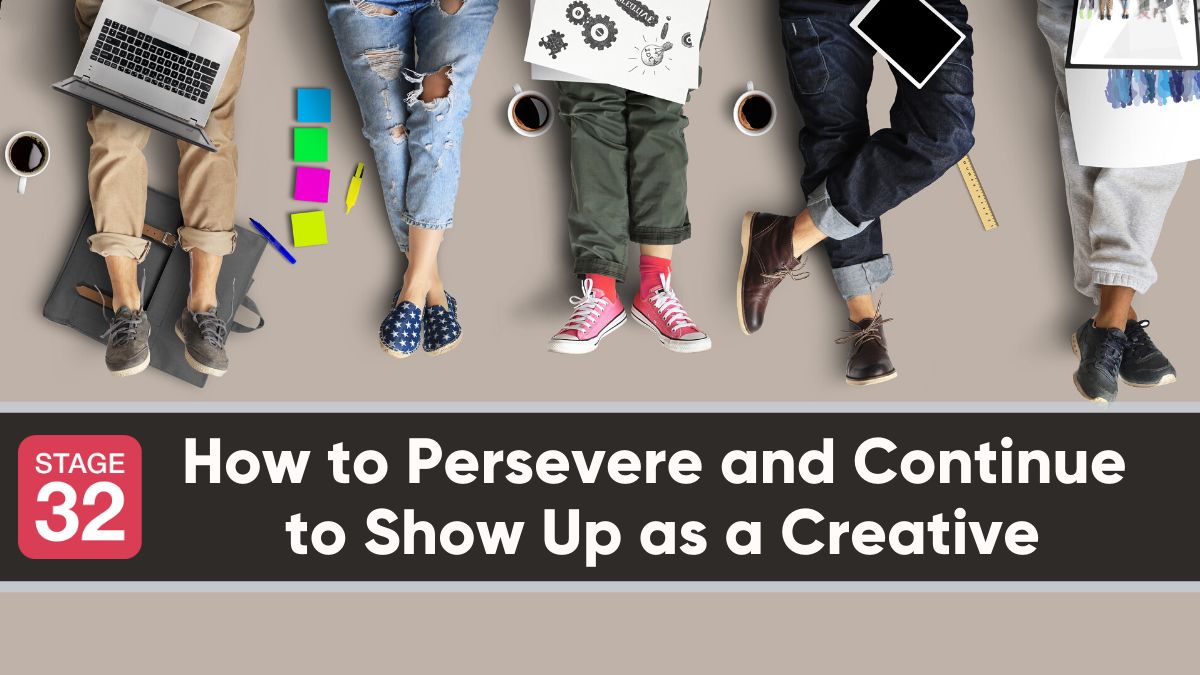How To Find Money for Movies: Fundraising
Ok, Stage 32! What you are about to read is a two-part article that’s been more than fifteen years in the making. For a little context, my arrival in Los Angeles landed me behind a telephone at the Exodus Film Group... where I pitched would-be investors on family entertainment for two long years. Probably the best part of working at Exodus, apart from the mentorship I received, was spending time with Basil Poledouris - who wrote the film score for RoboCop and many other personally beloved movies besides. Leaving Exodus behind, I helped a small group of producers found a company called Unified Pictures. At Unified, I made more than half a decade’s worth of cold calls and worked side-by-side with personal heroes from David Lynch to Gary Oldman. Finally, I managed to cultivate my screenwriting, directing, and producing efforts into a properly glaring conflict of interest and scheduling… and the resulting meeting was the end of my film finance career, such as it exists outside of my own productions.
Following the demise of my life as a film finance executive, I paid more than half a decade’s worth of bills making fundraising phone calls for non-profit institutions ranging from the Democratic National Committee to the ACLU, Planned Parenthood and the NRDC. My reputation as a fundraiser was built on repairing campaign lists that were “broken” by overcalling and unprofessionalism, as well as by securing a healthy number of monthly commitments from donors. What I’m telling you is that while I do know how to ask for money with confidence and authority, I can also beg for it with dignity and grace.

FUNDRAISING AND FINANCING
Most filmmakers use the words “fundraising” and “financing” interchangeably... and that’s bad. More than anything, I want people to understand that financing and fundraising are completely different skill sets. Financing is the act of securing money through some promise of return. Fundraising is what you do when you’re asking people to give you money for personal reasons.
Money’s money, right? Who cares where it comes from? When money moves in large amounts, government regulatory authorities care very deeply where it comes from. Fundraising and financing are very different kinds of solicitation, involving two very different sets of responsibilities. Mixing these approaches to business can be a seductive impulse, like we’re the first person to discover a clever and innovative way to make the system work for us. Trust me, that impulse is usually just a messy and self-defeating concession to our profound and deep-seated fears of rejection. On special occasions, it’s actually investment fraud.
Hey, while we’re on the subject of fraud:
DISCLAIMER: Under no circumstances should you take financial advice from a blogger on the internet… and people, I am exactly a blogger on the internet! Nary a law degree or financial license adorns my wall, and I learned the art of business from a maniac who grew up selling fake watches on the South Side of Chicago. Please, do not listen to anything I say!
Are we clear? I think we’re clear.
BEG, BORROW, OR STEAL
Let’s talk about the different ways in which a person can ask for money. Essentially, there are three: If you’re talking to donors, you’re begging for patronage with as much dignity as you can muster. Donors are people who give you money because they want to see you do the things you’re promising to do. While donors may not expect to ever see their money again, they will certainly expect you to provide an emotional return on their investment.
Banks and lenders will almost always hand you money, provided you can guarantee that money’s safe return - plus a little extra. What “a little extra” actually means will be determined pretty much exclusively by how badly you need the loan. With banks, you’re not really selling them anything. In fact, a loan is a product that banks sell you. Taking out a loan literally means you’re buying money for more than it’s worth. What pads that deal out, and what makes it worthwhile to borrow money, is the time the bank gives you to increase the value of the amount you’re borrowing. Making that deal happen is a simple matter of showing the bank that you can actually pay them. In film, our problem is that most of the time we can’t.
If you’re talking to an investor, you’re selling your ability as a leader. Investors are people or institutions who put money into a project or company, understanding that they may never see that money again. What investors want in return is the realistic likelihood of making quite a lot of money, although what that means can vary from investment to investment.

PLANS OF ATTACK
When seemingly reputable, indisputably spirited members of the indie film community go to prison for financial fraud, it’s usually because they handled money from donors, lenders, or investors, as if it came from someplace it did not. Don’t do that. Please, don’t do that.
Nobody expects a businessperson, let alone a filmmaker, to know everything there is to know about finance. Personally, I’ve found that being fluent in two of these three financing methods is enough to move my projects forward. Part of what makes my producing partnerships strong is that we’re not all experts in the same kinds of financing. While I’ve worked with both investors and donors, my weakness is lending. Both my manager and my producing partner are pretty handy when it comes to what they call “structured financing...” which is a fancy way of saying “loans for movies.”
As I said, this article comes in two parts. In “How To Find Money for Movies: Financing,” we’ll talk through the art of talking to investors... and for laughs, we’ll cover my limited knowledge of structured financing. Here and now, let’s break down the mechanics of fundraising.
Asking one person to give you money may be emotionally stressful and culturally disagreeable, but once you put a structure to it you’ll find it’s not actually a ton of work. Finding the kind of money it takes to impact a film budget, however, means you need to be asking a lot of people. Unless you have a very rich family that’s willing to support your career, you really only have one choice when it comes to fundraising a career in entertainment:
CROWDFUNDING
If there’s a secret to crowdfunding, it’s that there’s no secret to crowdfunding. Successful crowdfunding efforts come from having an active, engaged community. If you want to crowdfund a $1 million movie, you need to build a relationship with an audience big enough to drive the success of that $1 million movie.
To be clear, what I’m saying here is that crowdfunding your movie so that you can take it to the festivals and build an audience for it WILL NOT WORK. Yes, I know this is not the future that Kickstarter promised us. Nevertheless, here we are.
So what’s the point of crowdfunding?

ACTS OF SERVICE
Building your community is the point. Finding people to whom you can be of service, and making sure you’ve got the tools to help, is the first step in any fundraising operation. When you do ask those people for money, it’s so you can expand the services you’re already providing. Making yourself necessary to people usually means some of those people will give you money so you can keep doing whatever it is you’re doing… and that’s the secret to effective fundraising.
Wrapping your head around this fact is the first step in harnessing all the power that crowdfunding has to offer. For your own health and productivity, all this chatter about which platform is hot and which platform is dead should be dismissed as whining from people who simply aren’t doing the work. If a platform works for you, it’s because that platform is a good distribution tool for the services and community support you offer.
Figure out what you want to give to people, and build a system around getting that service to the people who need it. Definitely include crowdfunding tools in the structure of that system, so you can monetize it effectively… but if you think money is the point of what you are doing, people will smell your bullshit coming from a mile away. Focus your labor on addressing the needs of the community you are building, find individual people who need what you provide, and the success of your crowdfunding will grow proportionately.
SCALE-UP SUSTAINABLY
With any project that involves crowdfunding, one of the most important ingredients to success is sustainability. Make sure that at any point, you can keep doing the work to move your plan forward even if nobody gives you a dime. Remember that your job is to make yourself necessary… and whether or not you’re meeting the needs of other people is never actually up to you. So long as your project is built to survive the “stop and go” with regards to income, then you can keep right on trying to meet people’s needs until it actually starts to work.
Ultimately, the process and the work itself needs to be the point of what you’re doing. If and when your fundraising efforts plateau, you need to be comfortable and prepared to keep chugging along right where you’re at until the work you’re putting in connects with people and needs you didn’t know were out there. When that connection happens, it’s a really great feeling. Unquestionably, the best thing about producing movies and other media through crowdfunding systems is that you wind up knowing your audience very personally.

HOW DOES THIS EVEN APPLY TO MOVIES?
Crowdfunding a directorial debut science-fiction epic that costs $250 million is a useless effort. At this point in the development of our internet culture, I think most people understand that this is a fact… but there are other ways to make crowdfunding work for you. If you’re willing to develop your content as a novel, then you might consider putting the first chapter out there for free and then offering subscriptions so people can follow your writing. Maybe you’re willing to make a no-budget feature, and crowdfunding that movie can be a stepping stone to more ambitious work. Maybe you can offer instructional videos or a web series, and then ask people to support your work through one-off donations or a monthly gift.
Personally, I’m developing a tabletop roleplaying game around an IP I believe will prove astonishingly valuable… and through Patreon, I’m able to develop that world any which way I want and share it with my subscribers at the click of a button. Right now, everything in front of and behind my paywall is just written text. More subscribers mean I can develop more ambitious content, and I can involve more people. Having just found an artist who wants to develop this content with me, I’ll be using her interest and her craft as a reason for more people to subscribe. Soon enough, I’ll be paying her a modest but steady income. In turn, her art will help us attract more subscribers.
To make this work, service you’re providing and the work you’re doing has to be “its own reward.” Nobody is supporting my game because they want to see the cartoon in ten years, even though that cartoon feels inevitable to everyone in our community. If people are donating to my game, it’s because they love the game itself and the world we’re building together. Paying me now means someone is helping me get the next expansion done. Because they paid me, the game will be even better next month than it is right now. Don’t ask donors to buy into a long-term vision. Ask them to help you achieve an immediate, tangible goal, and make sure that goal is important.
As your community grows, your income from donations will grow accordingly. Eventually, you’ll be able to fundraise smaller financial goals in the development of larger projects. Plenty of filmmakers looking to make that $250 movie have found the money for a trailer or demo reel through crowdfunding. Just understand that even that modest goal requires a community of support behind it that needs to be built, and then maintained.

BEGGING FOR MONEY
Ironically, talking to donors very closely resembles the process folks imagine talking to investors would be like. First, it’s always important to introduce ourselves and the organization we represent in a friendly and professional manner. Next, and most importantly, thank this person. Thank them for their time, thank them for any support they may have given in the past, and thank them for literally anything else you can think of. In fundraising, gratitude is your greatest ally. Practice thanking people as much as possible, in fact.
From that moment on, we become storytellers. What is the story this donor wants to be a part of? How can we explain the work we are doing as an epic odyssey that might entice the involvement of other people? If your work and life are challenging enough, if you “live in interesting times,” to quote the proverb, there’s probably a handful of different “versions” of your story that you could be telling. Write down all those different versions of your story, and memorize them.
Tell one of those stories to your donor. Describe whatever challenge happens to be vexing you at the moment. Think of the largest amount of money you can possibly imagine ever asking a human being to give you, double it, and ask the donor to give you that money. Let the donor’s gift be the answer to your immediate problem, and explain it in those terms. Let them be the hero of your story.
If the donor says “no” to your request, then try telling them a different story and ask for half of what you asked for the last time. If they say no again, cut your ask down a little more and let them know on no uncertain terms how much their support means to you and your efforts. With this last “ask,” explain that getting them involved in your community and your work is more important than any specific dollar amount they might be able to donate… because that’s the literal truth. Fundraising really is about community building.
No matter what happens, you want to end this conversation with even more ardent expressions of gratitude. Even though they didn’t have to, this person took time to speak with you about your work - so thank them for that. Giving your donor a little space in which to feel appreciated, no matter what this person might be doing for you, is one more service you can provide to your community. Gratitude costs you literally nothing, so spare no expense.
IN CLOSING
If it feels like sucking up, you're probably doing it right. Remember that these people are making it possible for you to maintain and to expand you sustainable and necessary service... so if that service is something you truly believe in, your donors are pretty amazing human beings. Always treat them like it, even as your relationships with them become more personal over time.
Dealing with investors and banks is a very different proposition. Part two of this article is “How To Find Money for Movies: Financing,” and in that article, we’ll talk about the standards and practices that go into selling investments. Stay tuned!
About Tennyson E. Stead

Writer, director, and producer Tennyson E. Stead is an emerging leader in New Hollywood with a lifetime of stagework, a successful film development and finance career, and a body of screenwriting encompassing more than 30 projects - recently including the upcoming Emagine Content sci-fi tentpole Atlas Uprising, as well as a scathing film industry satire called Making the GAMP with director and newfound colleague Michael Wohl. In collaboration with producer Lucinda Bruce, Stead is writing and directing a sci-fi heist feature with his company 8 Sided Films entitled Quantum Theory. When Stead is not writing and directing feature films, he’s working in the theater, he’s developing content for gaming and transmedia, or he’s volunteering work and experience to help strengthen the content and community defining indie Hollywood.
More Stage 32 Articles by Tennyson:
REALITY CHECKS FROM AN INSPIRATIONAL CRIPPLE: Part I
REALITY CHECKS FROM AN INSPIRATIONAL CRIPPLE: Part II
HOW WE SCREWED THE SHOWBIZ CULTURE UP - AND HOW WE CAN FIX IT
WHAT IS SPECTACLE IN FILMMAKING - AND HOW CAN INDIE FILMMAKERS USE IT?
WHY I PASSED ON THAT SCREENPLAY
CASHING IN YOUR MILLION DOLLAR IDEA
HOW I SURVIVED THE HOLLYWOOD CRASH
THE GHOSTS OF SHOWBUSINESS PAST
HOW TO GET LEGENDARY PERFORMANCES FROM ACTORS
CRAFTING A FILM COMMUNITY BUILT ON SUPPORT
Let's hear your thoughts in the comments below!
Got an idea for a post? Or have you collaborated with Stage 32 members to create a project? We'd love to hear about it. Email Taylor at taylor@stage32.com and let's get your post published!
Please help support your fellow Stage 32ers by sharing this on social. Check out the social media buttons at the top to share on Instagram @stage32online Twitter @stage32 Facebook @stage32 and LinkedIn @stage-32
| Stay Connected & Stay Creative with Stage 32: Watch Our Virtual Events On-Demand Now! |
| How to Persevere and Continue to Show Up as a Creative |
Search Stage 32 Blog
There are now 3681 blog posts for you to enjoy. Search them all by tags below.
Acting, Advice, Cinematography, Coffee & Content, Composing, Contests, Distribution, Featured, Filmmaking, Financing, Inspirational, Networking, Producing, Screenwriting, Success Stories, Tips, Trending,Relevant Tags
Recommended Articles

Coffee & Content: How Do You Overcome Negativity?

Why Write About Your Experiences Through Fantastical Lenses?

Own The Future: Why I Believe Screenwriters Should Embrace AI
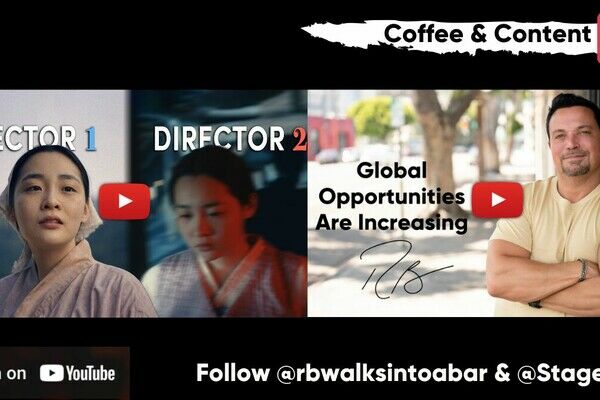
Coffee & Content: Global Opportunities Are Increasing!
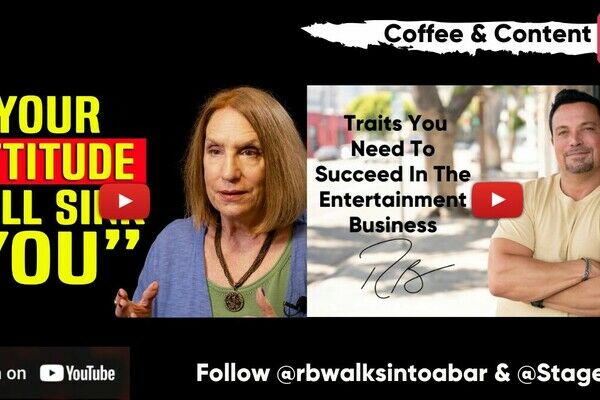
Coffee & Content: Traits You Need To Succeed In The Entertainment Business

November Write Club Week #4: Congratulations, You Got Through the Door! How Are You Keeping it Open?

6 Steps To A Successful Writing Partnership
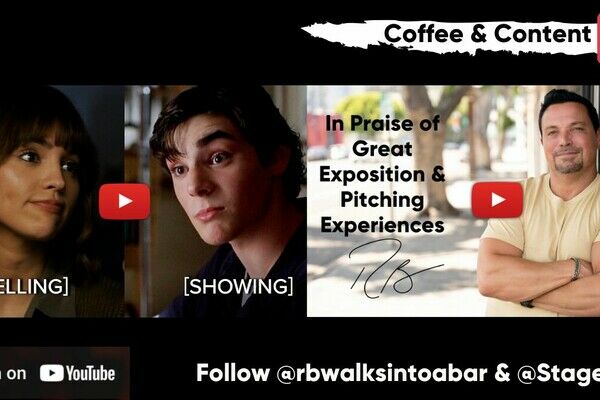
Coffee & Content: In Praise of Great Exposition & Pitching Experiences

St. Pete-Clearwater Film Commission Partners with Stage 32!
